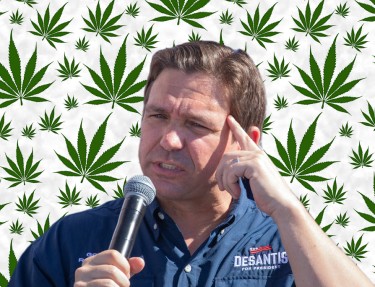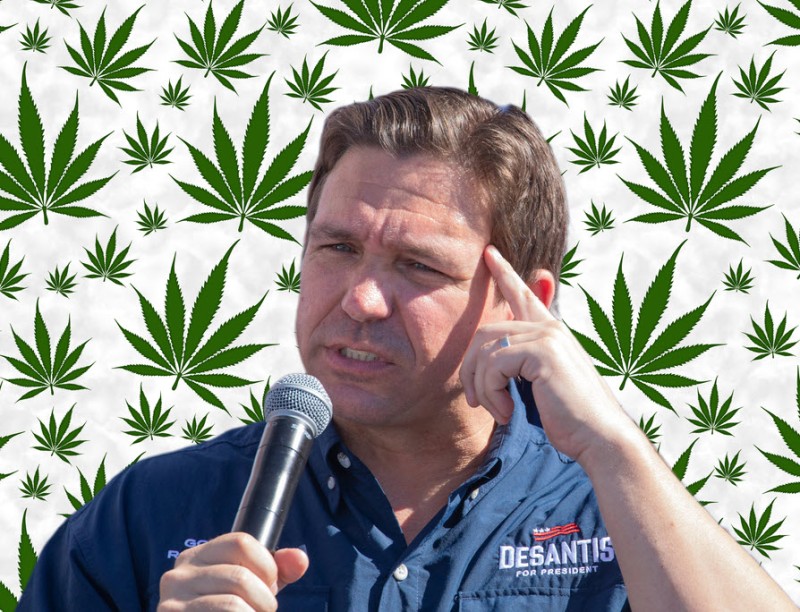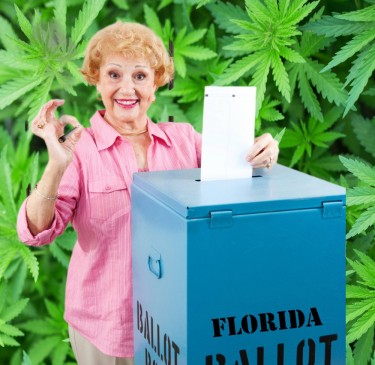
Gov. DeSantis Vetoes a New Bill That Would Regulate Intoxicating Hemp As He Bashes Cannabis Legalization Amendment
"Statergery" as said by Will Ferrell playing George Bush on SNL will forever be remembered by a generation as a politician who was "punching above his weight class" in acumen and vocabulary.
Now, Gov. DeSantis of Florida, appears to be playing a game of chess vs checkers with the marijuana industry, as he battles his voters for the right to have legal, recreational cannabis.
DeSantis is vetoing the bill to protect the Florida hemp industry and the jobs it creates, as well as giving a zinger to the marijuana compananies of Florida who very much wanted to see intoxicating hemp removed from the state so that when the time comes, they are the only cannabis dealers in town.
Gov. Ron DeSantis, who has been adamantly opposed to a proposed constitutional amendment legalizing marijuana for recreational use, gave prospective rivals in the cannabis industry a victory on Friday when he vetoed a bill that would have severely limited the manufacturing and distribution of goods derived from hemp and recognized for their euphoric properties.
The measure (SB 1698) was approved by lawmakers in March, with proponents pointing out safety issues as a result of the rising usage of THC, or tetrahydrocannabinol.
The measure sought to restrict the quantity of delta-9 THC and outlaw the sale of goods containing delta-8 THC. Hemp contains two cannabinoids that can give users a high: delta-8 and delta-9.
DeSantis Cites Overregulation Concerns in Veto Message
DeSantis noted the "commendable goals" of the measure in a veto letter on Friday. Still, he maintained that it would "impose debilitating regulatory burdens on small businesses and almost certainly fail to achieve its purposes."
The law was fiercely opposed by hemp farmers and companies that manufacture and market goods derived from hemp, who said it would essentially shut down the sector, costing the state millions of dollars in lost income and thousands of jobs.
Despite these reservations, the Senate unanimously adopted the measure and passed by the House in the closing days of this year's legislative session by a vote of 64 to 48.
DeSantis encouraged lawmakers to take a fresh look at the matter during the 2025 legislative session and to collaborate with all pertinent parties to create a thorough regulatory framework that would govern the production and distribution of hemp and goods produced from it.
"Commonsense, non-arbitrary regulation will safeguard public health and safety, allow legitimate industry to grow, and remove bad actors from the market—providing much-needed stability for businesses and consumers alike," DeSantis wrote.
Hemp Industry Applauds DeSantis' Decision
The Florida Healthy Alternatives Association, representing the hemp industry, praised DeSantis' decision.
“The Legislature heard our concerns but didn’t fully grasp the impact of their legislation. Governor DeSantis understands that everyday Floridians rely on hemp and CBD products to avoid harmful and addictive medications and that thousands of Floridians have built local businesses to serve this critical need,” the group stated.
The veto letter provided a roadmap for a revised bill, advising lawmakers to focus on quality control, retail sales, and labeling, marketing, and packaging.
Future legislation should include “random, unannounced inspections, standardized and repeated testing, and dosing, packaging, and unit purchase caps that better correspond to the character of the products and their intoxicating capabilities,” DeSantis wrote.
“Upon review, Senate Bill 1698’s effort to address those limitations misses the mark,” he added.
Additionally, the governor recommended that lawmakers ensure “hemp-derived cannabinoids are sold behind the counter” and that hemp retail shops be located away from schools, religious institutions, and other places where children and families gather.
“These shops should not present themselves as medical offices, and the Legislature should consider measures to prevent the ubiquity and concentration of these retail locations in communities across the state,” his letter said.
DeSantis also urged the Department of Agriculture and Consumer Services “to continue using its full, existing authority to root out products that violate Florida law.” Agriculture Commissioner Wilton Simpson has prioritized eliminating hemp-based products that target children or induce euphoria.
In a statement on Friday, Simpson said his department “will continue to aggressively implement the law.”
The Florida Healthy Alternatives Association gathered some of the state's most powerful lobbyists to oppose the proposal, and opponents initiated an anti-veto effort even before the law passed.
According to state lobbyist registration data, the group was one of the largest spenders on legislative lobbying during the first three months of the year, paying an estimated $155,000 to lobbyists between January 1 and March 31. The 60-day legislative session ended on March 8.
Two key lobbyists for the association, Evan Power and Bill Helmich, have worked for the group since 2022 and are leaders of the Republican Party of Florida. Power was elected chairman of the state party in January, and Helmich was appointed interim executive director in April.
The governor’s office received thousands of emails urging DeSantis to veto the bill, vastly outnumbering the few dozen messages in favor of the measure.
Florida's Hemp Boom and the Path Ahead
Since the Legislature authorized hemp production to comply with federal agricultural legislation, Florida's hemp business has grown significantly during the last five years. Although both hemp and marijuana are cannabis plants, they have different amounts of THC. THC content in hemp "does not exceed 2 milligrams per serving and 10 milligrams per container on a wet-weight basis, whichever is less," or 0.3 per cent or less.
DeSantis signed legislation last year that forbade the selling of hemp products to anyone under the age of 21, outlawed goods made of hemp that were appealing to minors, and mandated that facilities that processed hemp adhere to safety regulations.
The bill targeted euphoria-inducing products that compete with the state's medical marijuana industry, which generates an estimated $2 billion annually.
DeSantis' veto bolsters the hemp industry ahead of the November election when Floridians will vote on a constitutional amendment to allow recreational marijuana.
If approved, the ballot proposal would permit the state’s currently licensed medical marijuana firms to sell recreational pot. Amendment 3 would also allow “other state-licensed entities” to enter the market, potentially increasing competition for the hemp industry.
DeSantis is adamantly against the proposed constitutional change, and his resistance is anticipated to intensify—possibly with assistance from the hemp sector.
The 2016 voter-approved medical marijuana amendment is the precursor to the recreational marijuana proposal. There are already more than 600 medicinal marijuana shops in Florida.
"I see marijuana businesses everywhere in Florida, not just in South Florida, but do we need to do more with that? Should there be more marijuana in our local communities? Although it is a very, very wide amendment, I don't think it will work out well," DeSantis stated.
Bottom Line
The rejection of SB 1698 by Governor Ron DeSantis has brought much-needed relief to the hemp sector in Florida. The industry was facing strict new rules that may have hurt small firms and the overall market. By voting against the measure, DeSantis expressed worries about excessive regulation and its possible effects on the economy, as well as the need for more sensible and practical laws. This ruling benefits the hemp industry as Florida gets closer to a crucial vote on legalizing marijuana for recreational use, which might further influence the state's cannabis environment. Despite the expanding economy and public interest in marijuana, DeSantis remains opposed to its broader legalization, as seen by his stance.






